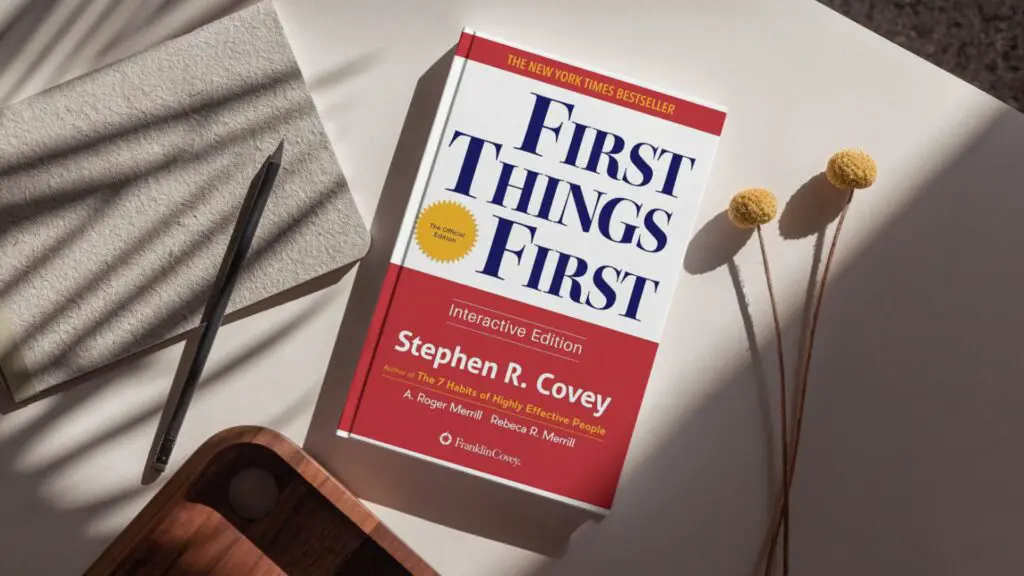Introduction
“First Things First” is an inspiring self-help book that seeks to guide readers towards better time management and a more fulfilling life. This book is an excellent guide for people who are struggling to balance their work and personal lives and feel overwhelmed with the constant demands of modern living.
Table of Contents
ToggleEssential Information
The book is written by Stephen R Covey, Copyright dated 1994. Type of book can be labelled as self-buildup/Self-help while general subject matter is time management, prioritization, and personal effectiveness. Price of the book varies based on edition and format and ISBN is 978-0684802039. Price of the book is $18.99 approx.
Amazon Links
Product details:
- Publisher : Franklin Covey (July 14, 2015)
- Publication date : July 14, 2015
- Language : English
- File size : 5363 KB
- Simultaneous device usage : Unlimited
- Text-to-Speech : Enabled
- Screen Reader : Supported
- Enhanced typesetting : Enabled
- X-Ray : Enabled
- Word Wise : Enabled
- Print length : 365 pages
Product details:
Listening Length 1 hour and 10 minutes.
Author Stephen R. Covey, A. Roger Merrill, Rebecca R. Merrill.
Narrator Stephen R. Covey
Audible.com Release Date September 01, 2010
Publisher Simon & Schuster Audio
Program Type Audiobook
Version Abridged
Language English
Product details:
- Publisher : Simon & Schuster; First Edition (January 15, 1994)
- Language : English
- Hardcover : 384 pages
- ISBN-10 : 0671864416
- ISBN-13 : 978-0671864415
- Item Weight : 1.5 pounds
- Dimensions : 6.5 x 1.25 x 9.5 inches
About the Author
Covey is a well-known expert on personal development and leadership and has authored several books on these topics, including the best-selling “The 7 Habits of Highly Effective People. Covey’s background and qualifications make him highly qualified to write on the subject of time management and personal development. He has a master’s degree in business administration and a doctorate in religious education. He is also the co-founder and vice-chairman of Franklin Covey, a global professional services firm that specializes in leadership development and time management.
Author’s Purpose of Writing the Book
Writers’ purpose in writing this book is to help readers manage their time more effectively and prioritize their tasks in order to live a more fulfilling life. He aims to shift the focus from time management to life management, emphasizing the importance of balancing all aspects of life, including relationships, work, and personal growth. Covey believes that by focusing on what he calls the four quadrants of time management, readers can become more efficient, productive, and satisfied with their lives.
Target Audience
The intended audience for “First Things First” is anyone who wants to improve their time management skills and achieve a better balance in their life. This book is particularly relevant to busy professionals or leaders who feel overwhelmed by their workload and are struggling to find time for personal pursuits.
Intended Impact on Audience
“First Things First” is a thought-provoking and inspiring book that challenges readers to rethink their approach to time management and personal development. The book’s emphasis on the importance of balance and prioritization resonates strongly with readers who are struggling to juggle the demands of work and personal life.
Theme and Thesis
The theme of the book is the importance of prioritization and time management in personal and professional effectiveness. The thesis of the book is that by setting priorities based on our values and goals, we can become more effective in our personal and professional lives. Covey argues that we need to focus on what he calls “Quadrant II” activities that are important but not urgent, rather than constantly reacting to urgent but less important tasks. By doing so, we can achieve a greater sense of balance, meaning, and fulfillment in our lives.
Method of Development of Book
Covey’s writing style is formal and authoritative, but also engaging and easy to follow. He uses simple language and clear examples to illustrate his points, making his ideas accessible to readers of all levels. His style is well-suited to the intended audience and helps to reinforce his credibility as a time management expert. In this book he further elaborated and developed linkages on the concepts he introduced in his previous book, “The Seven Habits of Highly Effective People”.
Table of Contents
The book is divided into four parts “The Clock and the Compass,” “The Main Thing,” “The Synergy of Interdependence,” and “The Power of Will.” Each part is further divided into chapters that explore various aspects of time management and personal development. The Table of Contents provides a clear overview of the book’s structure and helps readers to navigate its content.
Description
The book is divided into four parts “The Clock and the Compass,” “The Main Thing,” “The Synergy of Interdependence,” and “The Power of Will.” Each part is further divided into chapters that explore various aspects of time management and personal development. The Table of Contents provides a clear overview of the book’s structure and helps readers to navigate its content.
Narration
Book initially highlights the pervasive challenges individuals face in today’s rapidly evolving world that includes an overwhelming number of tasks, an ever-increasing array of distractions, and a constant struggle to strike a balance between personal and professional commitments. Covey introduces readers to the concept of the “Time Management Matrix,” which categorizes activities based on their importance and urgency, providing a framework for effective decision-making and prioritization.
Subsequently Covey emphasizes the significance of aligning actions with core values and long-term goals, advocating for a shift from a reactive, crisis-driven approach to a proactive, values-centered one. He explores the concept of “quadrant two” activities, which encompass important but non-urgent tasks such as relationship-building, personal growth, and planning. By dedicating time and attention to these quadrant two activities, Covey asserts that individuals can lead more purposeful lives and make progress towards their overarching aspirations.
Throughout the book, Covey delves into various aspects of personal effectiveness, such as setting goals, managing relationships, and nurturing physical and emotional well-being. He encourages readers to define their personal “roles” and establish clear priorities within each role, fostering a sense of balance and harmony across different dimensions of life.
Covey further delves into the importance of integrity, trust, and self-discipline in maintaining effective time management practices. He stresses the need for individuals to take responsibility for their choices and actions, fostering a proactive mindset that empowers them to navigate life’s challenges and seize opportunities.
Drawing from real-life examples and anecdotes, Covey illustrates his principles in action, providing readers with relatable scenarios and practical insights. He offers guidance on overcoming common obstacles and distractions and provides strategies for fostering focus and deep work.
Limitations
The book presents a comprehensive framework for time management, which some readers may find overwhelming or difficult to implement. The multitude of concepts, principles, and practices introduced throughout the book may be challenging to grasp and put into action effectively. The book was originally published in 1994, before the advent of many technological advancements and digital tools that have since transformed the way people work and manage their time. Consequently,
“First Things First” does not extensively address the specific challenges and opportunities presented by technology in today’s fast-paced, interconnected world. Implementing the principles and practices outlined in the book requires a significant investment of time and effort. Readers may find it challenging to dedicate the necessary resources to consistently apply the recommended strategies, particularly if they have demanding schedules or numerous commitments.
Analysis
The book presents a novel interpretation based on previously available documents and Covey’s extensive experience in the field of personal development. Covey introduces the concept of the “time quadrants,” which categorizes tasks based on their level of importance and urgency. He emphasizes the need to prioritize tasks that are both important and non-urgent, as these are the tasks that will lead to long-term success and fulfillment.
Covey also stresses the importance of identifying one’s values and aligning one’s actions with those values. He argues that a lack of clarity about one’s values leads to a lack of purpose and direction in life, which can lead to feelings of stress and dissatisfaction. By taking the time to identify one’s values and priorities, one can make more informed decisions about how to spend their time and energy.
The book provides practical advice and tools for managing time and achieving a more fulfilling life. Covey encourages readers to set realistic goals, delegate tasks, and learn to say no when necessary. He also emphasizes the importance of balance in life, arguing that it is not enough to simply focus on work or personal life; both are important and should be given equal attention.
Conclusion
“First Things First” is a book for anyone who is looking to improve time management skills and achieve goals. The book provides a comprehensive system for managing our time and our lives, with practical tools and exercises to help the reader apply the concepts to their own situation. The author’s emphasis on personal integrity and interdependence also makes this book unique, as it helps us to see that time management is not just about getting things done, but also about living a meaningful and fulfilling life. Overall, “First Things First” is an excellent book that has the potential to change the way we approach our work and our lives.


